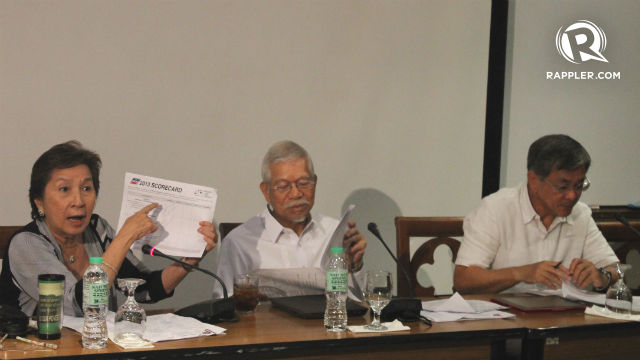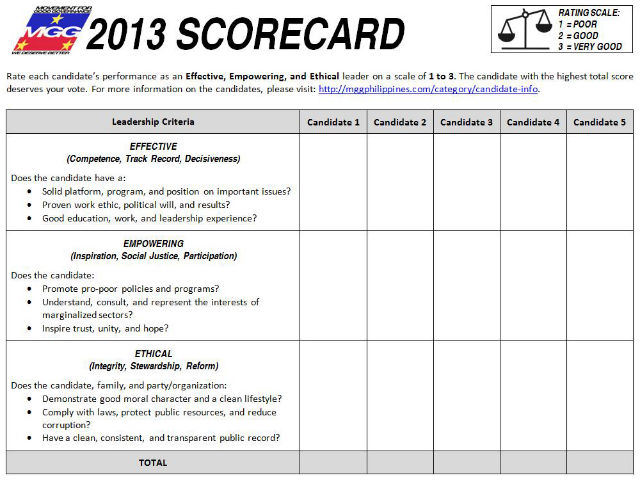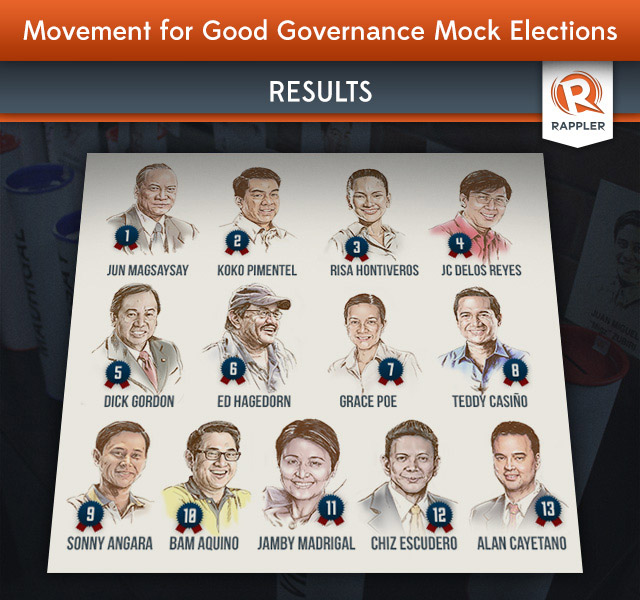SUMMARY
This is AI generated summarization, which may have errors. For context, always refer to the full article.

MANILA, Philippines – Senatorial candidates who come from political dynasties should kiss their senatorial dreams good-bye, according to economics professor Winnie Monsod.
This was also the general sentiment of the panelists in Timbangan 2013, a forum organized by the Movement for Good Governance (MGG) held at the Ateneo Professional Schools on Tuesday, April 17.
Membership in political dynasties was the biggest deal breaker for the panelists led by Monsod, former Negros Occidental Governor Rafael Coscolluela, and former finance secretary Roberto de Ocampo, among others. The panelists were asked to evaluate 24 senatorial candidates who are leading in the opinion surveys based on a scorecard that gives top marks for “effective, ethical, and empowering leadership.”
Most of the panelists agreed that though some candidates may pass the criteria for effective and empowering leadership, they fall short on the ethical score if they come from a dynasty.
“You cannot say there are good dynasties and bad [dynasties]. It’s against the Constitution!” said Monsod as she explained her opposition to voting for candidates who have relatives in Congress. “Empirically, 70% of the legislators belong to political dynasties. It’s time to send a message.”
Coscolluela, also a former government executive, compared the senatorial candidates of today to the heavyweights when he was a younger politician. “Pepe Diokno, Raul Manglapus, Jovito Salonga, where are they now? We just don’t have [people like] them anymore.”

Benchmark
The candidates were categorized in the following manner: reelectionists, comeback candidates, candidates from the lower house, and first-timers.
For the reelectionists, only Sen Koko Pimentel got the approval of all 3 panelists. For Ateneo professor Joy Aceron, Pimentel’s name is clean but she had higher expectations of his short stint in the Senate, particularly in the campaign against election cheating.
For the comeback candidates, the panelists unanimously endorsed former senator Jun Magsaysay Jr, citing his stellar legislative record and clean name. De Ocampo added, “if I throw him in the previous set of candidates, or even in any other candidates, [Magsaysay] will stand out. And it’s too bad that we didn’t think of running him for president.”
Former senators Jamby Madrigal and Dick Gordon also got the nods of some of the panelists.
For the members of Congress and the newbie aspirants, the panelists were more divided. Teddy Casiño, Risa Hontiveros, JC de los Reyes, Ed Hagedorn and Grace Poe were all recognized for their advocacies and potential in the Senate.
Passed over were the scions of leading politicians and senatorial candidates with colorful past lives.
Monsod pointed out that she based her choices on the criteria set by the MGG scorecard. She admitted that, although some candidates might have shortcomings, they should be weighed against their track record. “We’re not voting for saints here. We’re voting for people who have more plus than negatives,” said Monsod. She added that people can use the MGG scorecard to make their own informed choices in the coming elections.

Mock elections
A highlight of the forum was a mock election where all participants could vote for their preferred candidates.
Of the 24 senatorial candidates, former senator Magsaysay Jr got the top spot in the post-forum voting. Pimentel and former Rep Risa Hontiveros got the 2nd and 3rd spots, respectively.

Advocacy
The MGG is a group of academics, former government officials, and concerned citizens that promotes transparency, participatory, and accountable governance. The MGG has spearheaded the Timbangan Forums since 2010 with Professor Monsod as panel chair. The forum was jointly organized with Mulat Pinoy and Youth Vote Philippines.
Dr Milwida Guevara, one of the founding members of the MGG, says that she has high hopes for the Timbangan forums, and hopes that the Timbangan would not only be used for formal forums but also by families and other people to critically evaluate political candidates.
Guevara also hopes that the scorecard could be translated into other local dialects like Bisaya and Bikolano to make it more accessible to the general public. – with reports by Zak Yuson/Julianne Marie Leybag/Jodesz Alysa Gavilan/Vina Vanessa Victorino/ Rappler.com
Editors note: The Timbangan forum was jointly organized with Mulat Pinoy and Youth Vote Philippines. An earlier draft included this info but was accidentally deleted in the first edition of the article. Our apologies.
Add a comment
How does this make you feel?
There are no comments yet. Add your comment to start the conversation.